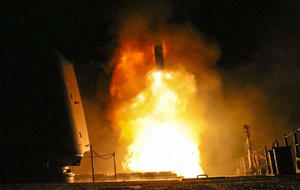Last Updated Apr 16, 2018 8:12 AM EDT
A team of international inspectors who arrived Saturday in the Syrian capital have not yet been allowed by Russian and Syrian authorities to access the site of an alleged chemical weapons attack, Western diplomats at a meeting of the global chemical weapons watchdog agency said Monday. Russian representatives said it was not possible yet to allow the fact-finding mission to the Douma attack site for security reasons.
Ahmet Üzümcü, director general of the OPCW, said only that the team had arrived in Damascus but not yet reached the area of the Douma suburb where an April 7 bombardment left at least 40 people dead.
The U.S., along with Britain and France, says Syrian leader Bashar Assad used a combination of chlorine gas and a nerve agent to poison his own people in the attack, and the three nations launched missile strikes on Friday targeting alleged chemical weapons sites in response.
Russia denied blocking the OPCW team access to the Douma attack site, and called an allegation from Britain that it was doing so, "the latest conjecture of our British colleagues."
Russian Deputy Foreign Minister Sergei Ryabkov said the mission wasn't allowed access because it hadn't secured the approval of the U.N. Department for Safety and Security. The OPCW is an independent international organization which works in conjunction with the United Nations, but is governed by its own Executive Council.
Days ago, Russia said it was certain OPCW inspectors would find no evidence of chemical weapons use in Douma when they arrived.
On Monday, Russian officials accused the U.S. of trying to "undermine the credibility" of the OPCW mission before inspectors reach the site. Earlier the U.S. representative to the watchdog organization said Russia may have tampered with evidence in Douma, according to the Reuters news agency.
"I can guarantee that Russia has not tampered with the site," Russian Foreign Minister Sergey Lavrov said Monday on the BBC's Hardtalk program. He also said the only evidence of a chemical attack by Syrian forces that the U.S. and its allies had offered was based "on media reports and social media."
Western nations, including the U.S., the Netherlands, Britain and France all demanded the OPCW team be given immediate, unfettered access to the site outside Damascus.
Syria and Russia have both repeatedly denied that any chemical attack even occurred in Douma, and Russian officials have even accused Britain of staging it. A British official at the OPCW meeting in The Hague, Netherlands, on Monday dismissed that allegation as "ludicrous."
After what President Donald Trump said were "precision strikes" on several sites vital to the Syrian chemical weapons program, Syrian leader Bashar al-Assad has appeared defiant, and even confident.
CBS News correspondent Seth Doane is in Damascus, where hundreds of Syrians have filled public squares on multiple occasions since the U.S. and allied missile strikes, chanting their support for Assad.
Appearing on state television over the weekend, Assad appeared relaxed and confident -- and for good reason, explained Doane; the missile strikes will do nothing to alter the course of the Syrian civil war, which Assad is winning with help from his Russian backers.
The Trump administration insists its mission in Syria is to defeat ISIS, and that the sole purpose of the late Friday night missile attack was to inhibit future chemical weapons attacks by Assad's regime.
The U.S. is also planning new sanctions against Russia, targeting entities accused of enabling Assad to use chemical weapons against his own people.















































